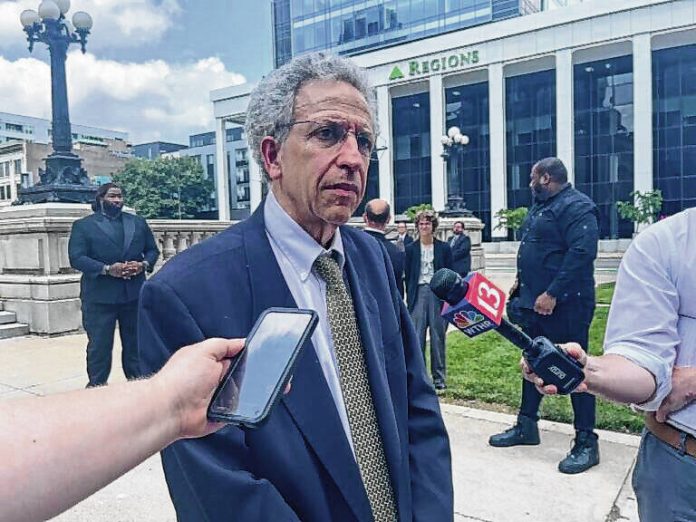A federal judge heard arguments Wednesday on whether to temporarily block a ban prohibiting Hoosier parents from pursuing gender-affirming care for their transgender children.
Plaintiffs represented by the American Civil Liberties Union of Indiana urged Judge James Patrick Hanlon to issue a preliminary injunction in the case stopping the new legislation, Senate Enrolled Act 480, from becoming law July 1.
Hanlon, who sits on the bench for the Southern District of Indiana, assured both parties he would issue a ruling “as soon as possible.”
Thomas Fisher, solicitor general with the Indiana Attorney General’s Office, said he thought Hanlon was “fair minded” and took arguments seriously.
“I don’t think we can predict what he’s going to do but he certainly asked very incisive questions of both sides,” Fisher told the press following the hearing.
Kenneth Falk, the ACLU’s legal director, seemed more confident that the plaintiffs — namely transgender children and their parents — would prevail based on similar cases in other states.
“Every other case has looked at a statute similar to this and in other states (the court) has entered a preliminary injunction,” Falk said following the hearing. “I’m hoping that’s what happened but we’ll have to see what the judge’s decision is.”
Scientific process debated in court
At the core of the arguments for both sides was whether researchers had provided sufficient enough scientific evidence to support or oppose a prohibition on gender-affirming care, which can include puberty blockers, hormone replacement therapies and surgical procedures.
When the legislature considered the ban earlier this year, testimony indicated that no health systems in the state performed genital reconstructive surgeries on minors. The law still allows psychotherapy.
According to court filings, more than 900 Hoosier children sought care at Riley Children’s Hospital in Indianapolis for gender dysphoria between 2018 and 2022, which included medical intervention banned under the legislation for many youth.
Hanlon asked Falk and Fisher about testimony from each side’s expert witnesses as well as what level of scientific “evidence” would be acceptable. Questions weighed the absence of randomized controlled trials, the reputation of various medical practices and institutions as well as the conflicting results from current research.
Notably, the ban prohibits puberty blockers and hormone therapy only for children with a gender dysphoria diagnosis. This is part of an equal protection argument in the case.
Falk said nearly every major medical organization in the country, including the American Medical Association, American Psychiatric Association and the Endocrine Society, supported gender-affirming care in cases of gender dysphoria — a condition that both sides agreed existed and could cause serious distress to individuals.
The state didn’t offer an alternative medical intervention for transgender youth other than therapy, Falk said, or provide a reason the state should interfere between a parent’s rights to determine medical treatment for their children.
“Therapy by itself doesn’t work; obviously it can in conjunction, but not by itself,” Falk said. “This is akin to telling a child with bipolar disorder to … wait until they’re 18 for treatment.”
Fisher disputed that characterization, calling the medical interventions a “grand experiment” with long-lasting effects such as decreased fertility and lower bone density.
“Our position is that when you’re talking about minors and long-term effects … those risks are very important and they justify government intervention,” Fisher said.
Hanlon noted that nearly every medical intervention had its risks and asked Fisher how to determine what risk was too much.
“Given the risks and given that they’re minors … this is really serious stuff (and) can’t rest on less rigorous scrutiny,” Fisher said. “There is a lack of evidence that these interventions are causing any relief from gender dysphoria.”
Fisher additionally said that limited clinical observations “isn’t how we do science” and professional consensus was a weak type of evidence. To which Falk said, “The fact that something has worked thousands of times for others means something.”
Pending court actions
In addition to considering whether to provide injunctive relief to the plaintiffs, Falk seemed to believe that an injunction could apply to any transgender Hoosier child receiving gender-affirming care even though a ruling to certify the case as class action remained pending.
The state disputed that, indicating that they believed an injunction would only apply to the four youth included in the lawsuit.
“The legislature thought this was an important enough issue that it enacted a law,” Fisher said. “There are risks are attendant for these children. The legislature wanted to address that with a law that goes into effect July 1.”
Falk outlined what’s at stake for his clients, some of whom testified before the General Assembly that they would flee the state should a ban advance and that their children were panicking.
“On July 1, without a preliminary injunction, no (transgender youth) will be able to get puberty blockers. People will then be forced to go through the wrong puberty. Eventually, as of December 31, no one will be able to get hormones,” Falk said.
“This is going to be tragic. Kids become suicidal; kids kill themselves. The statistics about the increased rate of suicide for person who are transgender are alarming. And this is why,” Falk said. “Because they can’t get care. They have to get this (injunction).”
By Whitney Downard. The Indiana Capital Chronicle is an independent, not-for-profit news organization that covers state government, policy and elections.





